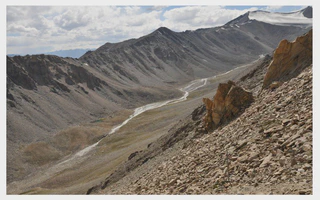Inferring Permafrost in the Indian Himalayas
 Photo credit: John Wani
Photo credit: John WaniPermafrost is defined as sub-surface material, excluding glaciers, having a temperature of less or equal to 0 °C for at least two consecutive years (ACGR, 1988, Van Everdingen, 2005). It is a thermal subsurface condition of the ground and considered as a climatic phenomenon. Understanding the characteristics and thermal regime of high-altitude mountain permafrost is one of the great challenges in the data scarce region’s like the trans-Himalayan Ladakh region. While the permafrost research on Tibetan Plateau has been extensively studied and globally very well recognised. However, a critical research gap has long existed regarding the permafrost conditions in the Indian Himalayan Region. The lack of data has hindered our ability to predict how these sensitive environments will respond to climate warming.

© 2021 John Mohd Wani. All rights reserved.
Our recent research efforts have focused on filling this gap. Through extensive field campaigns and modeling efforts using the GEOtop, we have provided the first-ever field-based permafrost characteristics for this region.
This work has been published in two key studies:
These studies move beyond theoretical and remote sensing assumptions, offering concrete data on ground thermal envelopes, active layer thickness, and the thermal state of the permafrost in the cold-arid Himalayas.
Key Implications
This research gives new impetus to mountain permafrost research in the region. By establishing a baseline of permafrost characteristics, we can now better understand:
- Hydrological Impacts: How thawing ground affects water availability in downstream basins.
- Slope Stability: The risk of landslides and debris flows, rockfalls, etc.
The Indian Himalaya Region is no longer a blank spot on the permafrost research map.
Read the Papers
References
- Wani, J. M., et al. (2023). Permafrost in the Upper Indus Basin: An active layer dynamics. Journal of Earth System Science, 132, 61. [DOI]
- Wani, J. M., et al. (2021). The surface energy balance in a cold and arid permafrost environment, Ladakh, Himalayas, India The Cryosphere, 15, 2273-2293. [DOI]
- Wani, J. M., et al. (2020). Single-year thermal regime and inferred permafrost occurrence in the upper Ganglass catchment of the cold-arid Himalaya, Ladakh, India Science of the Total Environment, 703, 134631. [DOI]